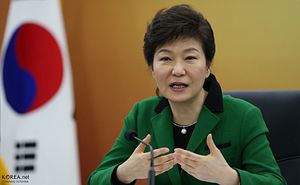Se-Woong Koo has a great Twitter photo and way-too-few followers. He is the editor-in-chief of Korea Exposé, a web journal that publishes sharp criticisms of South Korean society and politics. Koo recently published an op-ed in the New York Times entitled “Yet Another Disaster for Seoul.” It’s a strong, and justified, indictment of the Park Geun-hye administration. Government in South Korea has had its fair share of blunders, with the relatively poor handling of the recent MERS outbreak just the latest administrative faux pas.
In the third to last paragraph, Koo delivers his coup de grâce. He writes:
Government ineptitude has laid bare some uncomfortable truths. South Korea, as seen from the outside, is indeed that rare country that transitioned from poverty and dictatorship to affluence and democracy in a miraculously short time. Yet it is viewed by many people here as a crony capitalist state run by corrupt elites who have monopolized power and the national economy, fostering government incompetence and popular distrust of the state.
It’s a bold and provocative claim, and one that deserves some unpacking. Perhaps, for some, its counter-“rise” narrative will be most refreshing. It’s easy – too easy – to get swept away by South Korea’s rags to riches story. Rice paddy backwater to industrial powerhouse is as powerful a tale as any, and one that tends to subvert or overshadow more critical narratives.
It’s not as if what the South Korean state (and its close ally, industrial capital) did accomplish is anything to look past — it’s quite a story. But such a story tends to distract people, especially those looking in “from the outside.” My recent review of the book South Korea’s Rise is a case in point; obsession with development, progress, and modernization is the stuff of “uncritical histories” and indicates an affinity with overly simplistic theory, the kind which overpopulates the security studies field and IR (see also: Washington D.C.).
Poor administration and scandal upon scandal should, in theory, encourage those on the outside looking in to pause and reconsider. What might people there actually think of their government and public institutions in general?
Presidential approval ratings are a good place to start. While such ratings tend to drop (sometimes precipitously) for most heads of state in democratic countries over time, Park Geun-hye’s has plummeted, probably hitting rock bottom this week. As shown by this chart from the Hankook Ilbo (reporting Real Meter polling data), the Park administration’s approval rating dropped nearly 10 percentage points over a mere two week period. From May 18 to June 15 it plummeted from 43.4 percent to 34.6 percent, taking the sharpest dive after Seoul Mayor Park Won-soon publicly criticized the administration’s handling of the MERS crisis. Even pre-MERS, South Korea was seen as losing trust in the presidency (and other public institutions).
But we shouldn’t limit ourselves to reading such vulnerable measures as presidential approval ratings, nor should we focus so much on recent events, not when longitudinal data is available. Taking a step back from the immediate crisis and looking at people’s perception of the government (not simply the “president”) over the long term tells a slightly different tale, and one worth keeping in mind when assessing the state of things and people’s trust in the South Korean state.
According to data from the World Values Survey over the last decade and a half, people’s level of confidence in the government has actually been rising. Or, described slightly differently, people have more confidence in the government now than they did in the 1990s. Respondents were asked how much confidence they have in the government (located in Seoul). They could answer “A great deal,” “Quite a lot,” “Not very much,” or “None at all.” (“No answer” was given by some for some survey waves.)
Interestingly, of the available data, the last wave (conducted in 2012) was the first time those answering “Not very much” or “None at all” did not outnumber those answering “A great deal” or “Quite a lot.” Both groups tallied 50 percent of respondents. By contrast, survey results for confidence in Parliament, which go back to the early 1980s, show a consistent trend of low confidence in the democratic era.
Given the Republic of Korea’s contentious past, particularly the “legitimacy” challenge posed by the North Korean government, it is not an insignificant thing that confidence in the government has been steadily rising — South Korea has been referred to by at least one scholar of Korean politics as the “unloved Republic.” It makes it all the more damning that the administrative blunders and constant scandals of the current government are likely to put a serious dent public confidence. How much and whether it is irreversible is an open question and one worth debating — with Koo and others.
































